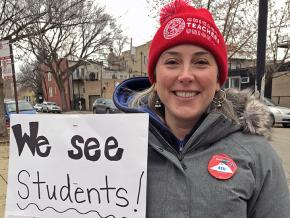We'll stay on the picket line until we get it done
On December 4, some 500 educators in Chicago’s Acero Schools charter network went on strike — the first strike against a charter school operator in the U.S. The striking workers are part of United Educators for Justice (UEJ), a division of the Chicago Teachers Union-Alliance of Charter Teachers and Staff (CTU-ACTS).
Meghan Thomas is a strike captain at Esmeralda Santiago Elementary in the city’s Humboldt Park neighborhood. She has worked as a kindergarten teacher at the school for two years and worked at UNO (Acero’s predecessor) for five years before that. She spoke to about the importance of the strike for UEJ members, their students and the wider fight for education justice.
WHY ARE you on strike?
WE ARE on strike because we want to have better educational systems in place for our students. We want to have culturally relevant curriculum to teach to our students. We want to make sure that we are providing all the special ed services and meeting all the special ed needs for all of our students. We want to make sure our schools are sanctuary schools and are protected from ICE.
We want to make sure that all of our office coordinators are making living wages. We want to make sure that we are able to keep all of our paraprofessionals — who are primarily people of color and women — provided with lanes of opportunity to get advanced education degrees and move into the teaching profession if that’s what they want. And we also want to have sustainable wages for teachers.
I HEAR that wage are considerably lower for charter school teachers than public school teachers in Chicago.

REGRETFULLY, YES. None of us who went into teaching wanted to become teachers to be rich and make lots of money. However, we do have families, and we do need to preserve that bottom line as well. We work significantly more than teachers in public schools — we work longer hours, have a longer school year, and we make, on average, 20 percent less than they do.
And we have larger classroom sizes. Right now, we have a classroom size of 32, but some schools have classroom sizes of up to 35. Research just does not support that as being best way to support our student’s needs. So that is another thing that we’re fighting for — to have smaller classroom sizes so to meet the needs of our students.
ANOTHER STRIKER told me that you’ve heard that some of the other charter schools are calling Acero and telling them not to give in to your demands?
YES. THE word is that [Acero CEO] Richard Rodriquez and Acero are receiving pressure not only from the Illinois Network of Charter Schools but also several charter schools nationwide, telling him not to give in to our demands — that it will set a precedent, first of all, for other charter schools to become unionized, and second of all, that they will have to change their for-profit model when education is a right and we shouldn’t be profiting from children’s education.
IT’S IRONIC that this “for-profit” model based on getting tax money — so it’s kind of a misnomer.
EXACTLY. AND the really upsetting part is that this school predominantly serves Latino Americans and immigrant families. These families want what’s best for their children, and they’re not being educated well enough by Acero to let them know that their money is being used to line Rich Rodriquez’s pockets. It’s not coming back into the classroom.
Rich Rodriquez is sitting on a surplus of over $10 million. Based on what we’ve asked for in negotiations so far, there’s plenty of money to give us what we want. Somewhere in the news, I read that that $10 million is going to be used to diversify Acero’s portfolio.
HOW LONG do you expect to be out on strike? How do you see your prospects going forward?
WE’RE GOING to be out here until we get this done. We made the decision to strike, and 98 percent of our members voted to move forward and have this strike vote. We’re out here — we’ve had a tremendous amount of showing from families, from staff members.
We’re going to stay here until we get it done. Our bargaining committee has been bargaining in good faith since last January. We are going to continue to do what’s right for our students — that’s what our vision is, this is what we stand for.
We want to break the model of charter schools, and we want to get the money back into the hands of our students who so desperately need it.


